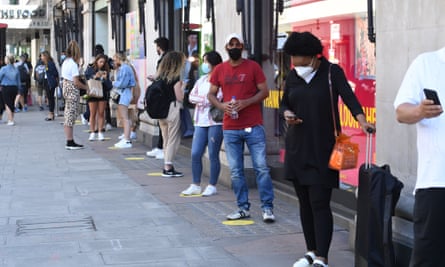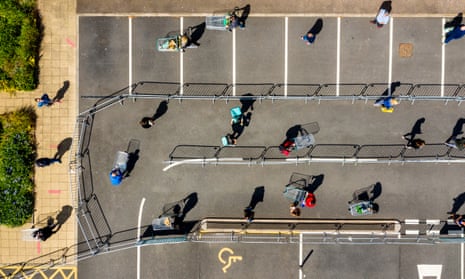The line snaked ominously around the forecourt. I knew B&Q mid-lockdown would be bad, but I hadn’t quite appreciated how bad. “They should call it Q&Q,” my son remarked. There were at least 50 people in a socially distanced trolley conga, braving airborne particles and suspicious glances to lay their hands on shelf brackets, parasols, titanium-tipped screws.
What was my excuse? Just as a driver complains about being “in traffic” when they are in fact, traffic, so the queuer laments the phenomenon they create. I was painting my kitchen, I had run out of paint, a retail park just off the M5 was the only place where I could lay my hands on the right brand and shade, the government had said it was OK and we were wearing masks. But I also wanted to subject the queue to the sort of study that the anthropologist Kate Fox pioneered while researching her 2004 classic, Watching the English, which spends a lot of time discussing the commonly held notion that we are a nation of queuers. “An Englishman, even if he is alone, forms an orderly queue of one,” noted the Hungarian émigré George Mikes in his bestselling 1946 book, How to be an Alien. In his 1944 essay The English People, George Orwell remarked on “the orderly behaviour of English crowds, the lack of pushing and quarrelling, the willingness to form queues.”
Fox saw in the English queue (Welsh, Scottish and Northern Irish queues are no doubt available) a “microcosmic minidrama”, full of “scheming and intrigue, moral dilemmas, shame, face-saving, shifting alliances, anger and reconciliation.” The English, she says, are one of the only people who will spontaneously arrange themselves into a single queue when faced with the two-cashier problem. “Many of the foreign visitors I interviewed regard these processes with open-mouthed amazement,” she notes.
But Fox also found an interesting paradox. While the English are hyper-alert to infractions of queue etiquette – such as the “chat and cut”, that bugbear of Larry David in Curb Your Enthusiasm – hardly anyone dares object when it happens (as Larry David always would). So nowhere in the world is it easier to break queueing rules than it is in the UK. I now know this to be true, as my son and I busted B&Q simply by strolling confidently in through the exit. I know, I know, I know… I merely hoped to demonstrate that queues are not necessarily the impregnable bastions of fairness that they are made out to be. No one said a word.
But the coronavirus lockdown has brought many unexamined features of British life to the surface. Much of our queueing these days takes place virtually. “You are currently 25th in the queue,” said the automated voice when I phoned the council to ask whether there was much of a queue for the recycling centre that day. But during lockdown, queues have become far more visible as they have been moved outside shops to aid social distancing. It’s a daily pantomime of supposedly British notions of fair play and mustn’t grumble, and one of the few things to unite the nation other than a TikTok video of an American making tea in a microwave.

But just maybe, the queue is also a symbol of decline, inefficiency, docility, passivity and snobbery. When “non-essential” shops were allowed to open in mid-June, the scenes of queues outside Primark prompted a bizarre outburst of class-shaming on social media. I haven’t seen too many people doing that to the queues outside Waitrose – whose goods (unlike Primark’s) are available online. Meanwhile, the scenes of MPs snaking around Westminster thanks to Jacob Rees-Mogg’s archaic insistence on voting in person were a potent symbol of a government failing to move with the time. “It was a breeding ground for infection. Supermarkets have better Covid management in place,” one MP complained.
But there was a brief golden period of the lockdown queue – before the prime minister took ill, in the days when it really did seem as if we were in it together – and I don’t mind admitting that a particularly well-marshalled queue in the Horfield branch of Tesco moved me to tears. What at first appeared to be an ominous sign of misery and privation soon revealed itself to be a model of practical good sense and community spirit.
A Tesco spokesperson informs me that company policy is for all stores to start queues 6m from shop fronts, ensuring that 2m markers are clearly visible. There are signs alerting customers to the queues and, in the larger stores, “helpful colleagues” to marshal the queues – and “most importantly” to thank customers for their patience. A one-way system within stores and a “one in, one out” policy ensures that social distancing is observed. Longer hours minimise the need for queues; and NHS, healthcare and emergency services workers, vulnerable and elderly customers are invited to identify themselves and move to the front.
All this can make for a far more efficient shopping experience than usual. A socially distanced queue moves far quicker than a normal queue – what was previously a step forward is now a 2m stride. If you have a single queue for all checkouts, it eliminates any potential checkout envy. And if you have a nice Bristolian granny saying: “Thank you for waiting my lover, checkout number 15 there,” the whole experience can be quite spirit-lifting.

But how English – how British – is this experience? The orderly lines outside voting booths in the US state of Georgia, where the Republicans brazenly attempted to stop black people from voting in this month’s primary, are a clear demonstration that, yes, other people can queue, too. The Japanese apparently view us as amateurs. A viral Reddit image shows customers at a Thai bank forming a virtual queue with their flip flops and sitting out the wait on a bench. In small shops in Spain, it is common to call out: “¿Quién es el último?” to find out who is last in line, a system that allows you to nip out for a cigarette without losing your place in the queue. It also relies on addressing a room of strangers and is therefore unlikely to catch on in the UK anytime soon.
Joe Moran, social historian at Liverpool John Moores University and author of Queuing for Beginners, notes that queues are by their nature temporary so don’t really lend themselves to comparative studies. “It’s really hard to say whether the British have been better at queuing than other nations, just because a queue doesn’t leave behind any evidence,” he says. “You can’t look into an archive to find out how well-mannered people were in queues in 1950. And manners are incredibly subjective, anyway.”
Still, there was a definite uptick in observations about the British/English and queueing when rationing took hold during the Second World War. This was the time when you might join a queue without knowing what it was you were lining up for. “Queuing was not a trivial thing, but a fraught feature of everyday life,” says Moran. “My hunch is that the myth developed as a necessary fiction. We had to convince ourselves that this was something we were good at, and could take pride in, because times were so difficult.” Pregnant women were given a stamp in their ration book that allowed them to jump queues – a little like NHS workers today. This gave rise to a popular joke. Shopkeeper: “Excuse me, Miss, are you pregnant?” Woman: “Well, I wasn’t when I joined the queue!”
To some extent, the notion that we are a nation of queuers becomes a self-seeding myth. The idea that the British are a uniquely fair-minded people may not be based on any objective truth – but the more we tell the story, the more alert we are to infractions, especially from people who don’t look like us. As the historian of empire, Charlotte Lydia Riley notes, the story helps reinforce the idea that the British are a deeply law-abiding people who will wait patiently and respect hierarchy. “The counterpoint of the careful British queuer is the colonial mob,” she says. “The idea that foreigners don’t know how to queue also fits into the broader co-opting of very normal and universal things as ‘British values’.”
Moran further notes that people have been complaining about the decline of the British queue for as long as the British queue has been a notable phenomenon. A 1957 Times leader on the death of the bus queue lamented: “It is nowadays hard to have a relationship with a subordinate which rests on mutual consideration based on acknowledged authority.” But bus queues are seldom seen now for a far more practical reason: they don’t make sense when there are different buses serving the same stop.
“There’s always this nostalgia for the moment we were better queuers,” notes Moran. “As with a lot of nostalgia, that moment can never be located. It exists alongside the myth. But that’s what sustains myths. They need to be constantly maintained and we need to be vigilant.”
It was Winston Churchill who made the most political hay out of queues – but as ever with Churchill, the reality is a little different from how it is remembered. After the Labour landslide of 1945, he conflated the queues with the new un-British strain of socialism. “Why should queues become a permanent, continuous feature of our life?” he thundered on the campaign trail for the 1950 general election. “The Socialist dream is no longer Utopia, but Queuetopia.” Clement Attlee’s Labour won that contest but lost in a snap election held the following year, having lost the support of middle-class women, who resented the amount of time they now spent queuing.
In his book Militant Housewives, James Hinton quotes the Labour Party Women’s Organisation complaining that “the last election was lost mainly in the queue at the butcher’s or the grocer’s”. Labour’s Ed Miliband noted on his podcast Reasons to be Cheerful that Rees-Mogg’s Parliament queue itself became a site of insurrection, as MPs had plenty of time to scheme and grumble while waiting to cast their vote – even while observing the 2m social distancing.
Queues are often less fair than they first appear. A day pass for Alton Towers – reopening in early July – is £34 in advance. A Fastrack Platinum ticket that allows you to jump all the queues is £100. We are not equally able to spend hours waiting in queues either. The rules governing holding someone else’s place in the queue are far from set in stone. And as much as we love to perpetuate an idea of fairness, we’re usually open to exploiting advantage. Think of all the politicians who have promised that Britain will be “first in the queue” when it comes to trade deals or vaccines in the future.
“It’s about clarity,” says Moran. “If people know the rules, they tend to follow them. The good thing about a coronavirus queue is that it’s ordered – it has to be – so it’s visibly fair. When people see that it makes it much easier to be patient.” But the queue itself is not enough – it relies on individuals within it.









